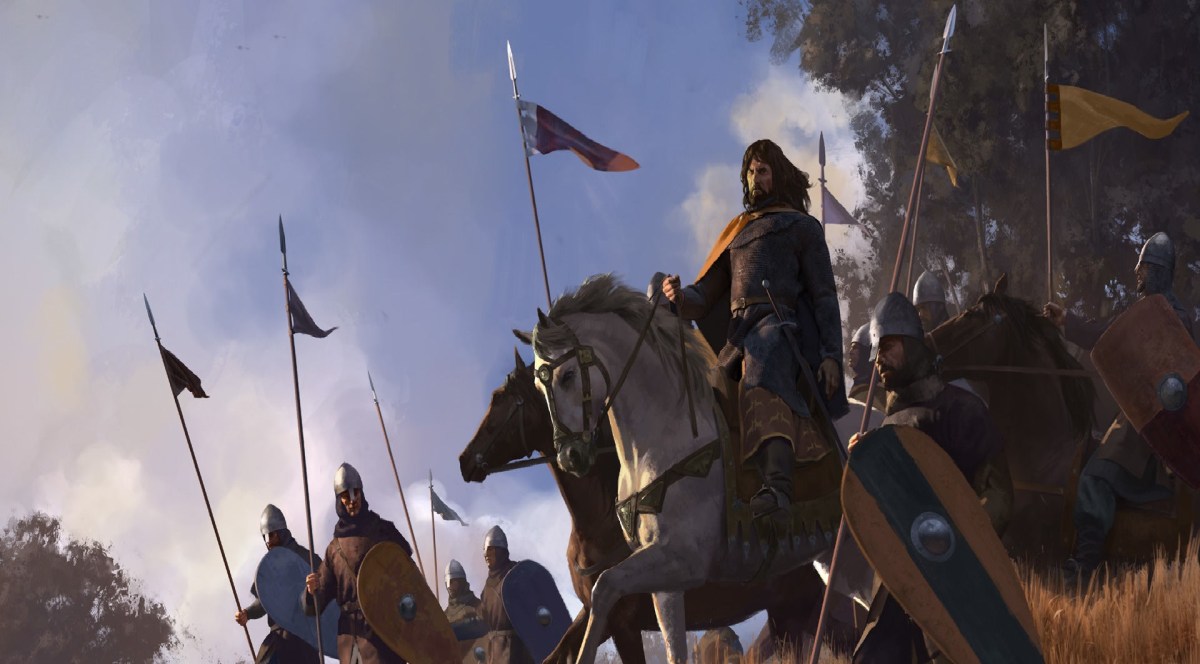We’re moving forward just after your completion of “The Dragon Banner” quest which allows you to form your own kingdom in Mount & Blade II: Bannerlord. Truth be told, being a king or a queen follows the same concepts as those when you were still a vassal. You’ll still have the same panels on the Kingdom menu (K), except, of course, you’re the one ruling now. We tackle all of these “old-but-new mechanics” in this guide.
Note: This guide is intended for Mount & Blade II: Bannerlord‘s early access stage. For more information, check out our Mount & Blade II: Bannerlord guides and features hub.
Mount & Blade II: Bannerlord – Forming your own kingdom
If you decided to form our own kingdom in Mount & Blade II: Bannerlord, that also means you gained your independence from your liege at the end of “The Dragon Banner” quest. Since you were independent for a time, you’ve lost all that stored influence. Don’t worry because you’ll start regaining it soon enough. Now that you lead your own kingdom, every battle victory gives you influence including those against unruly bandits and looters.
Before we continue, let’s recap how you used to gain influence as a vassal:
- Winning battles – Now that you lead a kingdom, every battle awards you with this; the bigger the fight, the more you get.
- Building a forum – The forum building in any main settlement you own adds +1 influence per day and it can be upgraded too; you can see the effects in the image below.
- Donating troops – Soldiers you donate to allied garrisons provide an influence boost.
- The Charm skill – It’s a slow and tedious process, but you do get some nice perks.
Moving forward, your focus should be on your kingdom’s policies. As a vassal, you usually got shafted by some of these laws. As a ruler in Mount & Blade II: Bannerlord, the sky’s the limit since you always have the final say.
Kingdom policies: Increasing influence as a ruler
These are the following kingdom policies that increase your influence gains (per day) in Mount & Blade II: Bannerlord:
- Council of the Commons – +1 influence and +1 militia production per notable in a settlement (owner’s clan); extremely powerful since this counts all the unique NPCs in a settlement including merchants and artisans.
- Feudal Inheritance – clans gain +1 influence for each fief they own; doubled cost of revoking a fief from a clan; gives influence depending on how many settlements are under your control.
- Sacred Majesty – ruler clan gains +5 influence; non-ruler clans lose 1 influence.
- Royal Guard – ruler clan gains +1 influence and +80 ruler’s party size; non-ruler clans lose 0.2 influence.
- Military Coronae – military achievements grant 30% more influence; troop wages are increased by 10%
- Castle Charters – castles give +1 influence; castle upgrades reduced by 20%.
- Magistrates – +1 influence for ruler clan; +1 security for towns; town taxes reduced by 5%.
- King’s Mercenaries – ruler gains double influence from mercenaries; non-ruler clans gain 10% less influence from battles.
- Senate – +1 influence for tier 3 clans.
- Noble Retinues – +1 influence for tier 4 clans and +50 party size for clan leaders.
- Peerage – tier 4 clan choices have doubled effects; influence cost of ruler overriding popular decision is doubled – the x2 effects don’t seem to work when combined with Noble Retinues.
- Lawspeakers – clan leaders with high Charm skill gain +1 influence and those with low Charm skill lose 1 point per day – this might be a problem if you’ve got around 75 Charm only.
- Lords’ Privy Council – +1 influence for tier 5 or higher clans.
- Serfdom – villages add +0.3 influence to the owner clan but lose 1 militia and 1 prosperity – might be a good choice if you can offset the losses.
- Bailiffs – +1 town security; towns with 60+ security add +1 influence to the owner; reduced town taxes by 0.5.
Get Council of the Commons first followed by Feudal Inheritance. Depending on the multipliers, you should end up with +40 influence per day, allowing you to enact all the policies you want in a short period.
More kingdom policies
There are also other policies that are extremely helpful in managing your kingdom and economy:
- Grazing Rights – +1 settlement loyalty and militia production.
- Tribunes of the People – +1 town loyalty and 5% reduction to town taxes.
- Imperial Towns – +1 loyalty and prosperity to towns owned by the ruler; towns held by non-rulers lose 0.3.
The Magistrates and Bailiffs policies, while they do add influence, are great for increasing settlement security. Towns with high securities also increase your relations (reputation) with the notable NPCs in the area. These are your merchants, artisans, and other characters who can provide you with more troops to recruit.
Managing your settlements (fiefs)
Concerning settlements, take note of these concepts:
- Towns – main settlements; more options for buildings; higher income; can recruit troops; defended by garrison and militia; can be given to vassals.
- Castles – fortified settlements; fewer options for buildings; lower income; cannot recruit troops; defended by garrison and militia; can be given to vassals.
- Villages – minor settlements; no options to build; low income; can recruit troops; defended by militia only; cannot be given to vassals but are “bound” to the nearest town or castle.
- Garrison forces – units that you manually place in a settlement to defend it (Keep -> Manage Garrison/Donate Garrison); consumes food.
- Militia forces – automatically generated by towns or castles as part of its defense force; these don’t consume food.
- “Bound” villages – all villages are tied to a specific town or castle and occupying those kinds of settlements will give you control of the villages.
- Prosperity – ensures that the settlement has higher wealth for taxation.
- Loyalty – ensures that the settlement does not rebel (as far as I know, this mechanic isn’t implemented yet in the game).
- Security – higher security improves relations with merchant NPCs which is helpful when recruiting high-tier troops.
- Food – prevents populace from starving; increased via granaries (towns) or gardens (castles).
- Production – speeds up construction of buildings and completion of projects.
- Governors – companions that you’ll assign to manage a city’s growth; they may provide bonuses depending on their Steward skill; make sure the governor and the settlement have the same culture to help increase loyalty.
You can also construct buildings and start projects. For buildings, prioritize those that increase influence, settlement prosperity, and additional militia units. For projects, these repeat indefinitely, so just select the “build house” option to ensure that prosperity continues to rise. Lastly, try to complete the quests from NPCs to help boost your relations in the area.
Managing your vassals
Recruiting vassals to your kingdom
Try to build up your influence as a ruler and start enacting all the laws that can help you first. When you’re ready, you can start recruiting lords to your faction. Don’t worry, you’ll still follow the same mechanics that require a few dialogue checks and a successful trade acceptance.
Remember these tidbits of info:
- You cannot promote companions into nobility, so you’ll need to recruit existing lords instead.
- If you’re at war with a kingdom and you successfully recruit one of their clans, that clan will bring all its owned settlements.
Update: Patch e1.0.5 has made it harder to trigger enemy defections if you’ve previously captured settlements from their kingdom. It might still work if you’re at war, but you avoided grabbing their territories prior to recruiting them.
In my case, I already had numerous laws in place before I recruited my first vassal clan. You can even see that an entire clan is at a negative influence value in the image below.
Vassals with low influence and no settlements won’t be able to contribute much in your war effort. They can’t create armies and they can’t earn more cash. Of course, we’ll want to give them a helping hand.
Improving vassal relations and handing over fiefs
Let’s say you’re already gaining +40 to 70 influence per day. You could definitely spare some. As you can see in the Kingdom -> Clans panel above, you can choose to “support” a vassal clan so that it gains a small amount of influence. Likewise, this action also increases your relations by +2 points.
Now, with regards to fiefs, you can only give vassals a settlement when it was newly-captured. This will be put to a vote and you’ll have three selections. These can be random and you cannot change the options, though it’s possible that vassals without lands get prioritized.
If you kept the settlement for yourself — or if you already had a settlement before your vassals joined — you can’t hand it over to them. If you go to the Kingdom -> Fiefs panel, the “propose” button simply won’t let you:
Similarly, you cannot give holdings to a vassal (or characters in other kingdoms) via bartering until you reach a higher level for your Trade skill. You’ll be able to obtain a perk that lets you exchange fiefs. It’s actually broken too since the AI will give you everything it has:
Vassal armies
As mentioned earlier, vassals with enough influence will be able to create their own armies. You can even attach them to your own much like when you were still the one following a liege.
The problem is that you don’t have a lot of control over what your AI vassals would do. They’re reliable enough in that they’ll form armies and march off to capture settlements, but you can’t direct them to specific areas or to support your advance. There may be times when they’d get their parties or armies annihilated just because they weren’t fully prepared.
Also, try to avoid donating high-tier troops to your vassals’ settlement garrisons. The latest hotfix makes them recruit all garrisoned units to their forces.
Mount & Blade II: Bannerlord is available now via Steam’s early access program. For more information, check out our guides and features hub.

















Published: Apr 2, 2020 12:00 pm